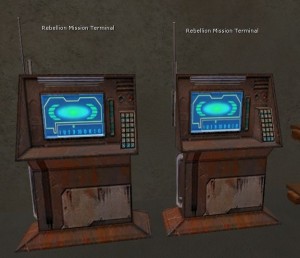Posted by Kray in Off-TORpic | 12 Comments
Off-TORpic: The State Of The Modern MMO
The folks over at Massively recently posted a Soapbox editorial referencing sci-fi author Neal Stephenson. In a nutshell, Stephenson recently published an essay condemning the current state of the aerospace industry, chastising the field for falling into “innovation starvation”, that is, slipping into a routine of comfortable engineering concepts and being too scared to push out any hot new ideas into the world. More or less, Stephenson says that the aerospace industry is in a rut.
In September, Stephenson went further in an interview with Forbes, touching on a few concepts of the MMO genre and gold farming. Massively expands on the writings of the author and brings it all together in a though-provoking piece. From the article:
Well, like aerospace industry projects, MMOs are expensive endeavors, and as the latter have grown more popular (and more costly to produce), the spark of creative madness that infused early titles has largely been extinguished in favor of safer, more homogenous design.
It’s certainly a polarizing topic, and one sure to create a lot of discussion. So, today we’re going to be trying something new with a Point/Counterpoint article discussing the opinions presented by Jef Reahard in the Massively article. Kray from Fully Operational will take the supporting viewpoint, and Momus of Blasters, Beggars & Credits fame will take the opposing viewpoint.
Don’t want to read Kray’s section? Click here to skip ahead to Momus.
Point (Kray)
MMOs are becoming stale — we need more creativity!
I have to say, I agree with what most of what Massively is saying in their editorial. Right now we’re in a plateau of MMO development, due in no small part to World of Warcraft.
Gamers, and people in general, are programmed to like things they can predict and that are familiar. Pop music, for instance, is something that typically follows a pretty basic formula, and continues to produce hits. Honestly, take a look at the explosion of boy bands back in the 90s and early 2000s and you’ll notice (if you didn’t already) that almost every song is the exact same thing. Intro, verse, chorus, verse, bridge, chorus, outro, extolling the beauty of some arbitrary girl. Throw in a few “ooo ahhs” and some ad-libbing during the instrumental sections and you’ve got every single pop song ever. Unfortunately, those songs fade out and die. Sure, I can remember all the words to As Long As You Love Me, but that doesn’t mean I queue it up in iTunes when I’m writing articles. No, the true hits and music that rocks the world is the innovative, the experimental, and the strange. Broad, sweeping changes to a stale genre are what’s needed — repetition turns us into zombies, and we need a curveball every now and then to break us out of that mold. Think of that iconic scene in 1984, with the dozens of people staring at a screen until it explodes in a bright light of awesomeness. Creativity and new ideas are that awesomeness.
WoW is a relatively stagnant game in between patches, and even more so in between expansions. Typically WoW subscriptions follow a pattern of increased growth at the release of an expansion, then that acceleration slows (and even begins to turn into a decline in subscribers) until the next expansion — the biggest periods of success for WoW are when they release a bunch of new features and exciting innovations. Game evolution is not limited to the same rules nature is; we can cheat, we can find great new ideas and capitalize on them. We as game buyers have the power to reward developers for pushing out a vibrant new gaming concepts or intellectual property by buying the game, talking about it online, playing it with friends, and generally making it a commercial success. Indie developers seem to be the key in this type of development, they take these wild ideas and risks that the big companies are scared to (or just don’t care to), basically priming the public for change and introducing viral concepts. That said, one thing is pretty true: most of the time new ideas aren’t enough in themself to pay the bills — in order to begin innovation, you must achieve profitability and a following first. Business entrepreneurs are encouraged to expect a year or two of financial loss before they even begin to think about profiting from some new hot business idea, regardless of how great it might be. The thing is, look at companies like EA, Activision-Blizzard, Bethesda, they’re mega giants in a multi-billion dollar industry. They need to create divisions that act like the “Fox Searchlight” of videogame development, pushing out new ideas and helping publish indie games.
MMOs in particular have become an endless cycle of WoW clones lately, and in order to be successful you -have- to have strong innovation, something to set you out from the crowd. Jumping in to the scene with the same feature set as everyone else is suicide, as has been shown by numerous MMO launches lately. Take a look at the past 5 years of MMO launches and you’ll see a consistent pattern of strong releases followed by a slow decline into obscurity, the biggest offender of current time being Rift. The saving grace of these failures, and one of the biggest innovations I’m proud of is the Free-to-Play market, something that has really exploded lately and has proven that a new and fresh idea doesn’t even have to be gameplay related. People are excited to pick up and play a game for free, and that initial burst of excitement with the game encourages purchases. When backed into a corner and facing financial disaster, game producers are starting to take risks and swing wildly trying to catch a grip before they get knocked off the ledge by the ogre that is Warcraft, and hopefully we’ll see some great things come out of the battle between Blizzard and the rest of the world.
In conclusion, people like short-term rewards and predictable things, and that’s a fact of human nature. Thing is, we didn’t get to this place of MMO standards by chance, it took a lot of exciting innovations and risks on the part of multiple game developers. WoW has become a conglomerate of the best ideas of MMO launches over the past decade all cobbled together, especially with the release of Mists of Pandaria and its all-too-familiar feature set. It hasn’t just followed the same formula for years and expected to keep subscribers. A balance needs to be struck with new MMOs: do the old faithful stuff good, and do the new stuff better than Blizzard can. There’s no room for compromise, and too many new games just favor one or the other.
Counterpoint (Momus)
Innovation: One small step for man
Innovation isn’t always the quantum leap of technology that we seem to take for granted.
If I had to pick apart the Massively opinion (and I do, thanks for Lethality!), I would start with his poor definition of “innovation.” I will surely concede that business practice and short-term capitalist thinking can stifle innovation; obviously, risk-averse investors looking to make a quick buck don’t want anything but numbers. Has it been happening in aerospace? A lot of astute observers think so.
But innovation isn’t defined by creating an entirely new product every year. Even the more clichéd version, “thinking outside of the box,” doesn’t always involve a complete re-invention. In this version, it is more or less a marketing term; “Look at our new MMO, now with I-N-N-O-V-A-T-I-O-N!” It is a varied term, and the usage here feels like someone who stands behind Power Point presentations that have “Web 2.0!” stamped on them in 48-point Impact font. It’s a buzz-word for new features and new gameplay that hasn’t been invented yet.
Our generation isn’t necessarily the most patient generation; we tend to want content as rapid as possible, do something new and interesting. But innovation isn’t sudden; sometimes, we need to let something evolve naturally. I feel that MMOs fall into this category; you don’t need leaps, you can do with small steps. Any new feature that hasn’t been done previously is paying forward for the genre as whole. Silly as it sounds now, quests were originally an innovation in the MMO sphere; to deride a game for its inclusion is ignoring that basic fact.
Innovation isn’t always creating a new rocket; sometimes it’s the inclusion of a piece of the rocket that’s improved. Similarly, here the author dismisses SWTOR as a “quest-grind,” without even talking about some of the features one might consider “innovative.” Full voice-over is no small task, which in and of itself is “innovation;” also, that the game was based around the story, and not created ad hoc to fit the gameplay, might also be considered innovation, albeit an innovation of the methodology. We should not forget about the costs associated with each; there should be no doubt that EA and Bioware are taking a leap by including it.
That the way the game plays is, almost certainly, not an innovation isn’t really a great knock – gaming has genres. Fans somewhat expect games to conform to those genres. Call of Duty and Battlefield didn’t get big by incorporating elements of Tetris or MUDs into them; similarly, World of Warcraft never assimilated Free Space 2 or first-person shooter conventions into itself.
The author of the Massively piece also includes “addition by subtraction,” which I, for one, find as a curious complaint. “Feature creep,” by which I mean the inclusion of too many features, is just as dangerous as not including enough features. It detracts from the focus and purpose – if something is an extraneous and unnecessary feature, why not remove it?
MMOs are a tricky bunch in general. In order to create a lasting game, there are many variables, because gamers play games for different reasons. If you don’t have enough social tools (or socials tools that aren’t robust enough), then players who enjoy social aspects won’t play; if you don’t include Player versus Environment in your end-game, those players won’t make the leap; if you don’t include guilds, Player versus Player, vehicles, non-combat pets, story, voiceover, dungeons/instances/flashpoints, leveling, abilities, specialization of characters, crafting, etc., you make each of those groups of players unhappy. There’s a great many features and technology required to create an MMO, and to make it successful requires a mix of familiar and new. The precise mix is what gives each game its specific flavor.
Innovation can happen behind the scenes as well – while his article focuses mainly on the gameplay, the author neglects that an MMO is also a concentration of servers and server-client code communicating with each other. People used to be impressed simply by the idea of so many people sharing the common experience; now it’s considered mundane, simple, obligatory even. There might be entire revolutions in technology taking place in that area, and we, the players, probably wouldn’t know about it except that our latency time went down, or we can load a few more players before our framerate bogs down. To discount one type of innovation for another is simply not playing fair.
Also, a final bit on the analogy: NASA is caught up in larger political issues as well. It’s a little unfair to compare MMOs, which have a proven track record of being profitable entities, to NASA, which by definition is unprofitable. MMOs don’t directly affect science, or children’s education (in the sense of curriculum), or a national budget. While “innovation” has surely lessened, it doesn’t mean that it isn’t present in either. Advances aren’t measured in quarters, months, or years; paradigm shifts are rare and unusual things. The market for MMOs might eventually force a shift in features, but blaming developers is a tired trend; they must meet what the market wants. If the genre is stagnant (which I do not concede), the blame is not in the laps of the people who make the games, it’s on the people who buy and play them.
In the end, there is obviously more than one way to look at this and I suppose for fans and developers of the genre that’s the ultimate challenge: how do you keep all of the people happy all of the time, without going bankrupt?
Leave a Reply
You must be logged in to post a comment.







I had the pleasure of seeing Neal Stephenson speak recently because my cousin recommended that I get his new book Reamde. I was intending to buy it because it dealt with online worlds and cool stuff I was interested in like that.
But, I went to see him speak and was not impressed with the way he treated and talked about gamers, with very little respect. He didn’t legitimize himself, he said that he played World of Warcraft “a little”, but clearly downplayed it because out of fear of the addiction stigma. When gamers got up and asked him questions, he sidestepped specific ideas and terms and focused much more on offline topics, oftentimes to the point of not answering the question or providing an opinion.
That’s fine, I understand that his audience was mostly older people who didn’t play online games. But his unwillingness to embrace that difference and actually try to teach the audience something about online games rather than snidely comment about gaming was disconcerting.
It just made me not really accept his opinions on online games as a legitimate source, he has insufficient respect.
As Momus says, innovation isn’t always a great, or obvious, leap forward. Those do happen, with the advent of games that nobody thought to, or dared, try before. But these are relatively few and far between.
The risk with innovation is that we humans are a varied and fickle bunch. One man’s innovation of the decade will have another complaining that the game is ruined. And idea that sinks one game could have meant enormous success for another. Or not. Innovation is not synonymous with success.
When people complain of a lack of innovation, is it that they feel there is no innovation or not enough innovation? Or is it that the innovation is not happening quickly enough? What is enough innovation? What is quickly enough? Is there an enough, or is there merely a six to twelve month honeymoon period before the complaints of a lack of innovation start up again?
How daring and innovative are the people who complain about a lack of innovation? Are they willing to stop buying titles they feel are not innovative, or innovative enough? To quote a part of my response to the article on Massively, “for most of us, playing it safe is in our nature. Sure, it can be disappointing. But heaping the blame on others for not starting the revolution is not going to help us get across Stephenson’s valley*, either.”
*Quote from Stephenson’s essay, via Massively:
“Any strategy that involves crossing a valley (accepting short-term losses to reach a higher hill in the distance) will soon be brought to a halt by the demands of a system that celebrates short-term gains and tolerates stagnation but condemns anything else as failure — in short, a world where big stuff can never get done.”
I think the winner is Kray… LYK A BAUS!
Thing is, myself and Momus both saw each side of the issue equally — we pretty much arbitrarily picked sides. It’s a really complex topic and one that doesn’t really have a clear answer one way or the other. Like I said at the end of my section: a balance needs to be made between small changes, big changes, and no changes.
Good guy Kray: compliments other writer after victory. :)
It’s a fun issue to think over, because regardless of whether you agree/disagree that there’s an issue, finding the solution to that issue is even harder.
Also, I found that I enjoyed reading his side more than mine.
That’s cause I’m cuter than you
Sadly, all too true.
Id hit it from tha bak wit a mac yo… Dat da booty son!
Interesting topic and a difficult one to claim victory in. WoW has certainly proved it’s at least innovative in obtaining players. I’m sure many people would say that if an MMO can’t get millions of players it is a failure. I disagree. I’ve played many (MMO)games that had a cult following at best, and I really enjoyed some of them. Heck, back in the early stages of MMO I played Neverwinter Nights on AOL dial up…it was great, expensive, and full of 8bit RP fun. When I look back at that game and something like RIFT, I find if funny that I had more fun on the 8 bit game. Why? Because it allowed my immagination to work, and I ended up playing with friends in a new digital world. It was fresh, shiney, and chock full of a rebranding of the pen & paper game I already knew. Rift wan’t really new to me. After playing several classes over my 1 month included game purchase, none really had me hooked. TOR may have solved this issue with many players by using decision involved story arcs to keep you engaged–This in my opinion, would be innovative. Even if it doesn’t blow out WoW in subscriber numbers. In fact I doubt it will. I do think it will have a solid base of loyal players and will be successful in it’s own bailiwick. In the end, I believe there will be room for many successful MMO’s and I hope so.
All excellent points: as the developers more clearly realize their vision, the less we get to realize our own imaginative vision of said product. Perhaps your point is that MMOs are somewhat over-developed?
Also, Kray and I have been needling each other about this topic in Mumble; frankly, we could probably keep people entertained if they logged on at all.
“No brilliant idea can gain general acceptance unless some stupidity is mixed in with it.”
– Fernando Pessoa
I always loved that quote.
Interesting article. I enjoy the idea of point/counterpoint. This type of article usually gets some great thoughts out in the open for readers (and the authors) to mull over.
Like both of you, I can see each side of the argument.
I’d like to point out that one of the first things I learned when I took writing classes in college was that it is impossible to please every single person in your audience. If you expect to do so, you are destined to fail.
This is something developers understand well. In order to succeed, they have to cater to the largest portion of the audience.
To make drastic innovations that cater to that huge of a population is not an easy thing to do. That’s why you see smaller innovations from rendition to rendition of gaming evolution. Or at least that’s what I think.
If you were to take the very first MMO ever and put it next to SWTOR, for instance, you could say that it would be one heck of an innovation to jump from one to the other. But in saying so, you’d be neglecting the fact that so many smaller innovations happened in between.
Thoughts are built upon thoughts, and that is how most innovation happens. At least that is what I believe.